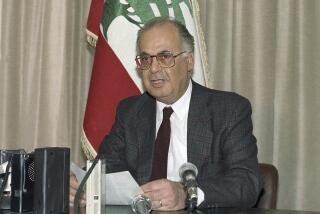Libyan professor rises to role of rebels’ prime minister
- Share via
Reporting from Tripoli, Libya — Ali Tarhouni could use some sleep. Fatigue has eclipsed elation for the U.S. business school professor who has become one of the new Libya’s most high-profile leaders.
“Caffeine and nicotine [are] what is keeping me going,” Tarhouni acknowledged Wednesday in the wood-paneled office where Moammar Kadafi’s prime minister was once ensconced.
His portfolio for Libya’s transitional government comprises economics and the energy sector, no small matters in an oil-rich nation embarking on an ambitious makeover of Kadafi’s peculiar strand of crony socialism.
But in the absence of top interim leaders here in Tripoli, Tarhouni has been serving as a kind of stand-in prime minister. His first task: getting a battered capital that initially lacked security, running water, power, public services and gasoline up and running again.
Today, the capital seems to be coming out of its post-revolutionary slumber. Shops are opening, traffic is picking up, a sense of security is growing. But the hard work of putting things back together has taken a toll on Tarhouni.
“I’m really, really exhausted,” he said, the bags under his eyes visible evidence. “This is the exhilaration,” he said, with irony.
But it seems safe to say that Tarhouni, 60, wouldn’t have it any other way. That he now stands near the pinnacle of power in his native land is an astonishing turn of fortune for the veteran economics lecturer at the University of Washington.
Reports from Seattle indicate that Tarhouni was a popular professor. But, unknown to most students, he was also a longtime activist in the disparate Libyan opposition, a loose network of exiles who worked to topple a regime that seemed intent on sticking around forever. Tarhouni left Libya as a young man in 1973, about the time the glow began to fade from Libya’s 1969 revolution and its charismatic leader.
Once in the United States, Tarhouni earned a doctorate in economics and finance and landed at the University of Washington in 1985. But the cause of his homeland stayed with him. Like other exiled critics, Tarhouni reportedly ended up on a Kadafi death list.
Tarhouni continued his double life until the “Arab Spring” breathed new life into Libya’s long-quiescent opposition. On Feb. 27, as protesters took to the streets of Benghazi, Tripoli and other cities, Tarhouni sent an email to friends and former students.
“As most of you know, I spent the better part of my life fighting to bring democracy to Libya and just about everything that I attempted failed,” Tarhouni wrote in the message, published by the Seattle Times. “Out of nowhere a volcano erupted. These young people who are marching only with stones in their hands facing grenades and live bullets are writing a new chapter for Libya similar to their brethren in Tunisia and Egypt.... I am not sure who is alive and who is dead but I feel that I need to go back to help as much as I can.”
He returned to Libya for the first time in decades and was named finance minister of the Libyan opposition council, based in Benghazi. He traveled abroad with fellow council members, trying to drum up support and persuade foreign capitals to turn over some of the billions of dollars in frozen Libyan assets.
Then Tripoli fell with unexpected suddeness.
Tarhouni says he has been looking into what he terms “mind-boggling” corruption that squandered “billions and billions” of dollars.
“Kadafi plundered the wealth,” Tarhouni said. “I can’t believe some of the documents that I see, come across, how they managed the money of the Libyan people. It was just like their private bank or farm.”
Once captured, Kadafi would be held responsible for the “stolen public treasure,” Tarhouni pledged.
What shape Libya’s future government will take remains uncertain. Many interests are jockeying for power. Not all are Jeffersonian democrats. But Tarhouni vowed that “transparency” will be a hallmark and that Libya will become “a country that our kids and grandkids are proud of.”
The phone rang. It was time for another meeting, this time with Tripoli’s rebel military commander. Tarhouni took another drag on his cigarette, the weariness yielding to a sense of mission in these heady days of the Libyan revolution.
More to Read
Sign up for Essential California
The most important California stories and recommendations in your inbox every morning.
You may occasionally receive promotional content from the Los Angeles Times.










